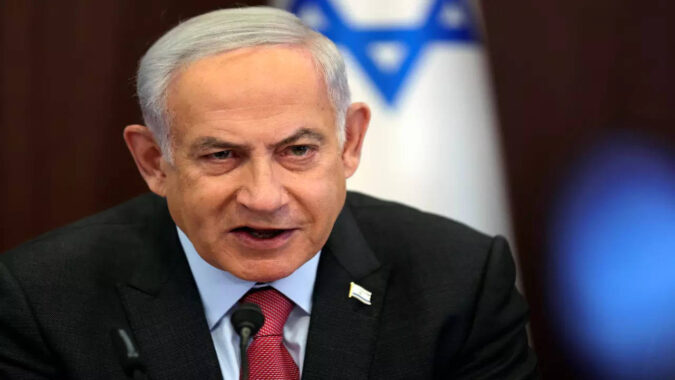JERUSALEM: PM Benjamin Netanyahu on Monday delayed a decision on bitterly contested plans for a judicial overhaul amid fears that Israel‘s worst national crisis in years could fracture his coalition or escalate into violence. It was unclear how far the bill’s delay to next month’s new parliamentary session, after mass protests and growing labour strikes, will satisfy either side or cool a crisis the army chief said on Monday made “this hour different to any before”.
“From a will to prevent the rift in the nation, I have decided to delay the second and third reading in order to reach a broad consensus,” he said in a TV address, calling the move “a chance to avoid a civil war”.
Netanyahu’s hard-right coalition partner, security minister Itamar Ben-Gvir, said he had agreed to the delay in return for a deal that he could form a National Guard under his ministry – a move opponents fiercely criticise as giving him his own militia.
Netanyahu’s comments came a day after he sacked his defence minister, Yoav Gallant, who had called for a halt to the legislative process citing national security concerns. Earlier Monday, prior to the prime minister’s address, tens of thousands of protesters had rallied near parliament in Jerusalem after the strike declaration. Flights had been disrupted, hospitals stopped non-emergency services, and even diplomats walked off the job. But immediately after Netanyahu announced the pause, Arnon Bar-David, chairman of the Histadrut trade union confederation, called off the strike.
About 80,000 demonstrators joined the Jerusalem rally against the reform package, the latest such protest to draw tens of thousands, Israeli media estimated. The stoppage also affected flights at Ben Gurion International Airport near Tel Aviv, where a journalist saw multiple delayed departures. Diplomatic staff were among those walking out, with Washington embassy spokesman Elad Strohmayer tweeting the Israeli mission “will be closed… until further notice”.
The government’s plan to tighten parliament’s control over judicial processes has triggered some of the biggest mass protests in Israeli history, with its opponents calling the move a threat to democracy. Supporters of the law, including far-right football fans, have staged counter demonstrations and police said they were reinforcing after social media threats of violent attacks on left wing Israelis.
Opposition leader Benny Gantz said the decision was “better late than never” but that he would not compromise on the “basics of democracy” in any dialogue on the new law.
Israeli President Isaac Herzog, who had staged a rare intervention into politics earlier on Monday to plead with Netanyahu to halt his judicial overhaul for the sake of national unity, said stopping it was “the right thing to do”.
The government plans have sparked concern from Israel’s allies including the United States. The White House noted President Joe Biden had told Netanyahu that “democratic values have always been, and must remain, a hallmark of the US-Israel relationship”.
Yoav Gallant, the outgoing defence minister who had been a staunch ally of Netanyahu, on Saturday cited “a clear, immediate and tangible threat to Israel’s security”. Referring to threats by reserve military personnel not to report for duty, he said: “The growing social rift has made its way into the (army) and security agencies.”
“From a will to prevent the rift in the nation, I have decided to delay the second and third reading in order to reach a broad consensus,” he said in a TV address, calling the move “a chance to avoid a civil war”.
Netanyahu’s hard-right coalition partner, security minister Itamar Ben-Gvir, said he had agreed to the delay in return for a deal that he could form a National Guard under his ministry – a move opponents fiercely criticise as giving him his own militia.
Netanyahu’s comments came a day after he sacked his defence minister, Yoav Gallant, who had called for a halt to the legislative process citing national security concerns. Earlier Monday, prior to the prime minister’s address, tens of thousands of protesters had rallied near parliament in Jerusalem after the strike declaration. Flights had been disrupted, hospitals stopped non-emergency services, and even diplomats walked off the job. But immediately after Netanyahu announced the pause, Arnon Bar-David, chairman of the Histadrut trade union confederation, called off the strike.
About 80,000 demonstrators joined the Jerusalem rally against the reform package, the latest such protest to draw tens of thousands, Israeli media estimated. The stoppage also affected flights at Ben Gurion International Airport near Tel Aviv, where a journalist saw multiple delayed departures. Diplomatic staff were among those walking out, with Washington embassy spokesman Elad Strohmayer tweeting the Israeli mission “will be closed… until further notice”.
The government’s plan to tighten parliament’s control over judicial processes has triggered some of the biggest mass protests in Israeli history, with its opponents calling the move a threat to democracy. Supporters of the law, including far-right football fans, have staged counter demonstrations and police said they were reinforcing after social media threats of violent attacks on left wing Israelis.
Opposition leader Benny Gantz said the decision was “better late than never” but that he would not compromise on the “basics of democracy” in any dialogue on the new law.
Israeli President Isaac Herzog, who had staged a rare intervention into politics earlier on Monday to plead with Netanyahu to halt his judicial overhaul for the sake of national unity, said stopping it was “the right thing to do”.
The government plans have sparked concern from Israel’s allies including the United States. The White House noted President Joe Biden had told Netanyahu that “democratic values have always been, and must remain, a hallmark of the US-Israel relationship”.
Yoav Gallant, the outgoing defence minister who had been a staunch ally of Netanyahu, on Saturday cited “a clear, immediate and tangible threat to Israel’s security”. Referring to threats by reserve military personnel not to report for duty, he said: “The growing social rift has made its way into the (army) and security agencies.”
